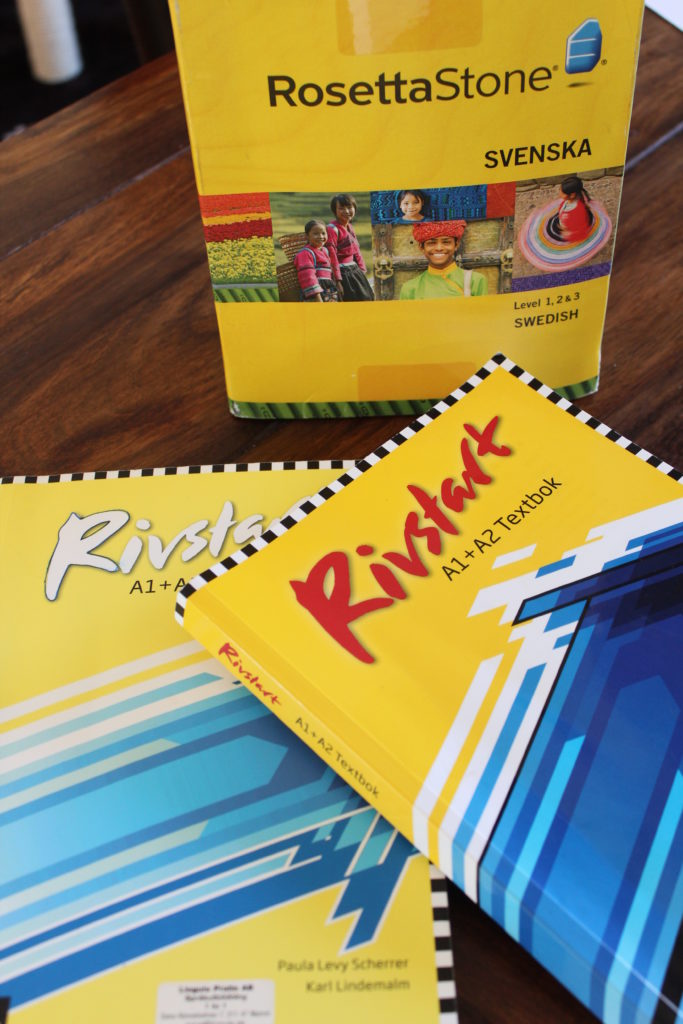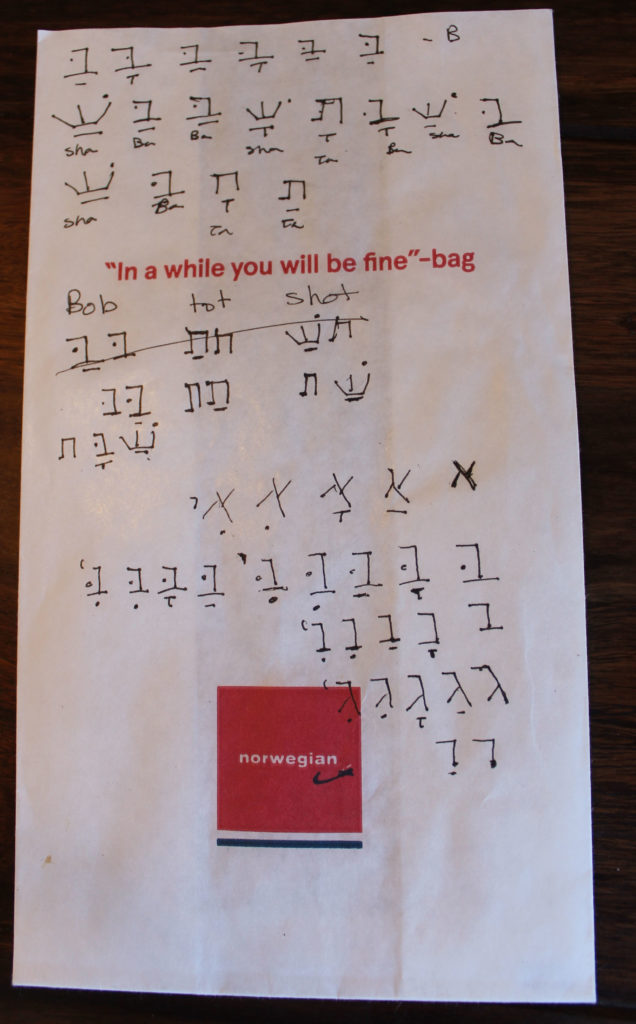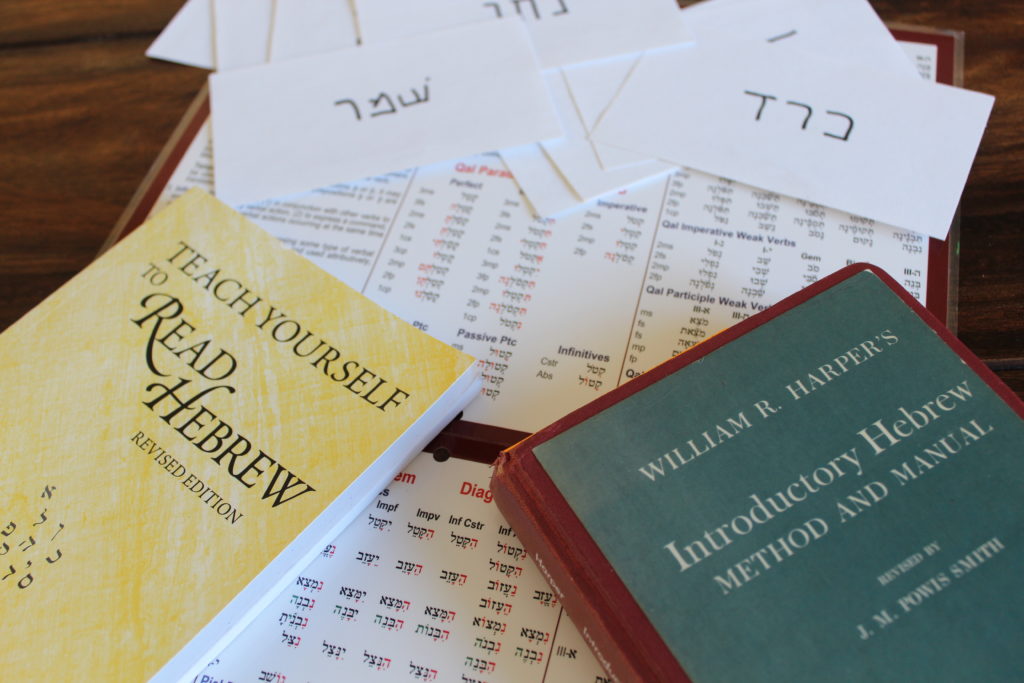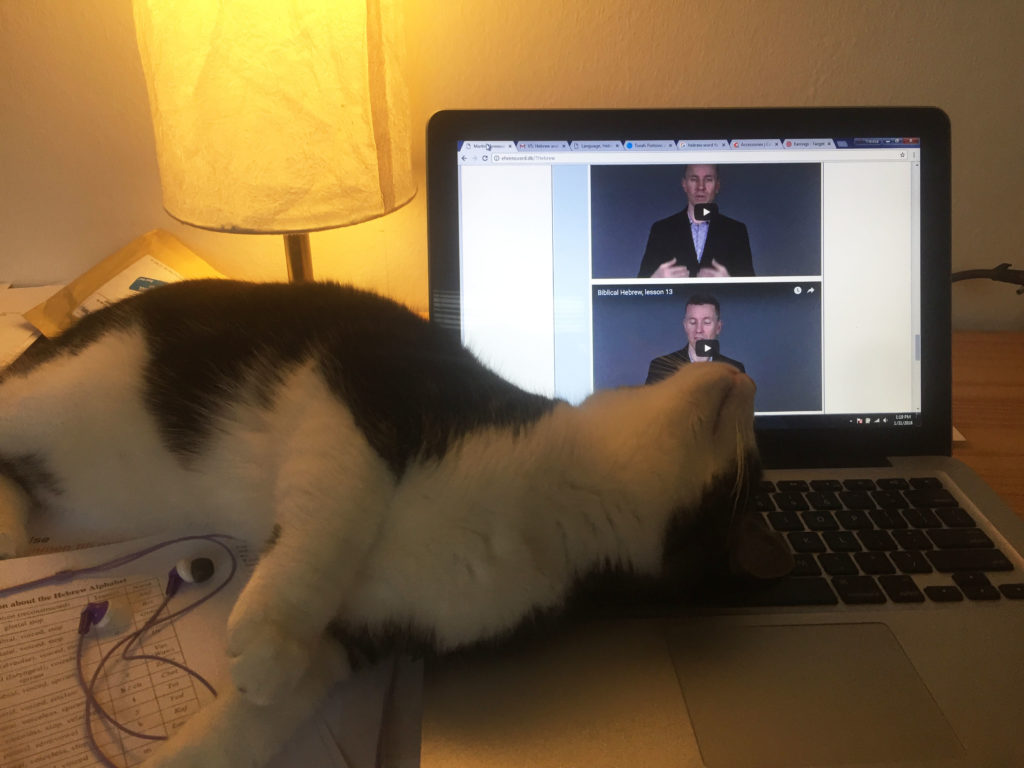
Rivstart, the standard Swedish textbook for the state sponsored language course, SFI, and Rosetta Stone, my starting place for Swedish studies before we arrived in Sweden. I now use Duolingo mostly.
Last November I dove deeper into my Swedish learning, taking an intense three-hour, daily class that lasted four weeks. It was perfect — exhausting and effective. I learned more than I could immediately articulate, but unfortunately the day after the class concluded I boarded a plane for the US and put Swedish learning on hold for a month.
That hold extended when I decided not to re-enroll in the intensive Swedish class and opted to try an online intensive crash course in Biblical Hebrew instead. I looked over the class syllabus and realized that the pace went alarmingly fast, a true crash course, so while I was in Los Angeles I ordered a little booklet on learning the alphabet and sounding out simple words. It arrived just in time, and while we were flying over the Atlantic Ocean, I was writing my first Hebrew letters on the back of a barf bag.

My very first attempts …
I was hooked.
I have always struggled with language learning. We lived in Los Angeles, for 14 years and I never made it past the first level of Spanish in Rosetta Stone. All of my New Year’s resolutions and short-lived attempts resulted in a “smattering” of Spanish vocabulary and common phrases. If I had to rate my language acquisition abilities, I would not have given myself much of a vote of confidence. But, fresh off of my budding success in Swedish, and aided by the gentle discouragement of my friends and family — “Oh, Hebrew is hard, you should just try Greek,” and “You can’t learn Hebrew in a few weeks,” and “I think you should focus on Swedish,” — I decided to give it a try. Why not?
By the time February rolled around I had a good handle on the alphabet, including the exotic vowels which are mostly expressed as subtext dots and dashes; and I was weary enough of the winter weather to press into the Hebrew course when it started the first week of February.

Extra curricular materials I found to help me through the course.
It was rough going. The class, which was composed of graduate students from around the world who already knew either Arabic and/or multiple European languages, went immediately from introducing the alphabet to reading and translating (with the help of a vocabulary sheet) long sentences. At first each sentence took me almost a half an hour to decode, but eventually, just before I thought I might give up, I began to see patterns. So I continued onward.

My not-so-helpful cat, keeping me company while I watch online lectures.
And now, more than halfway through the course, I am enjoying reading sentences from the Hebrew Bible in a matter of minutes instead of half an hour. I am still a long, long way from mastery; but I have learned enough to keep me motivated to learn more.
So why Hebrew? Why now?
I have always been at least mildly interested in learning Hebrew. But it always seemed like a quest out of my reach, a study that only serious Theologians pursue.
But in late November, as I was finishing my Swedish class, I attended a graduate school information fair at Lund University which happens to be a short train ride away. I looked into several graduate programs focusing on business or communications, but I was mostly fascinated by a graduate program called the Religious Roots of Europe — a study of early Judaism, Christianity and Islam, the connections between them and how they shaped Europe. It was a combination of so many things I love – history, theology, travel, personal narrative. Other then the fact that pursuing such a master’s degree seems to be counterproductive to actually getting a job – which I need to do – it seemed perfect. But there was a catch. Classical language study was a prerequisite. Students needed to have learned Hebrew, Arabic or Latin before they started the program.
I was disappointed, but ready to move on, when I met the head of the RRE program at Lund. He suggested I reach out to a colleague of his who teaches an intensive Hebrew course online, which I did.
Then after a few quick e-mail exchanges I started taking the Hebrew class on-line, not knowing if it would be too difficult for me to “keep up,” or if I would even be accepted into the graduate school program.
So here I was, in Sweden, in the dark of winter, studying ancient Hebrew with a Danish professor and handful of other international students from Germany, Syria, Turkey, France and other places. It was not what I had planned, but it has been unexpectedly delightful, like getting the Christmas present that I had always wanted but never mentioned because I did not know I wanted it.
Last month I took the train to Copenhagen and met my class in person. I was afraid that I would be embarrassingly unprepared, but all of my work at home had paid off and I was able to keep up with the class.
At this point I do not know if I will continue with the Religious Roots program in the fall. But even at this point I have already learned not only the basics of Biblical Hebrew, but also a powerful life lesson in what I am capable of, given enough dark winter hours.
I think I can. I think I can. I think I can.
Maybe it is not too crazy to think that I will be fluent in Swedish someday … and be able to read the Bible in Hebrew ….. and maybe order falafel in Israel. Maybe.
It is good to be inspired. That is worth the price of admission any day.
